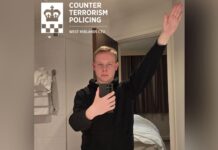A counter-terrorism expert has said that a rise in the number of people being referred to the government’s de-radicalisation programme is a result of the “climate of fear” being felt by public sector workers.
Dr Rizwaan Sabir, a lecturer at Liverpool John Moores University who specializes in counter-terrorism and insurgency, spoke to 5Pillars after The Guardian revealed that almost 4,000 people were referred to the Channel programme last year, an average of 11 people a day.
Channel is part of the Prevent strategy which supposedly identifies and provides support to individuals who are at risk of being drawn into terrorism.
Under the new counter terrorism law public sector workers such as teachers, lecturers and doctors are required to look out for the “signs of radicalisation” and report people (overwhelmingly Muslims) to the terror authorities if necessary.
“The rise in referrals suggests that the indicators used to assess ‘radical’ behaviour are far too ambiguous and generic and are therefore being applied too broadly by public sector workers,” Dr Sabir said.
“It also suggests that public sector workers are most probably confused about what their responsibilities under Prevent are and are therefore struggling to distinguish between ordinary behaviour and behaviour that is claimed to be indicative of future terrorism.

“At the same time, the significant increase in referrals can be explained by a climate of fear which operates on two levels: Firstly, public sector workers may be fearful that the failure to refer individuals to Channel may cause them to face some personal repercussion by the state, which is why they may be making Channel referrals more frequently and without enough self-reflection.
Subscribe to our newsletter and stay updated on the latest news and updates from around the Muslim world!
“Secondly, this fear is constantly being played upon by the negative and Islamophobic discourse put forward by the government and mainstream media outlets, both of whom overwhelmingly equate Islam as being an intrinsic threat to the UK, and Muslims to be a fifth-column and an enemy within.”
Dr Sabir also said that the large number of under 19s being referred to the counter terrorism authorities suggests that “ordinary adolescent behaviour” is being conflated with “signs of future criminality” and that teachers are struggling to distinguish between the two.
It also suggests that rather than nurturing radical ideas and critical thinking amongst pupils, schools and colleges are erring on the side of caution and reporting pupils to Channel, he said.
Dr Sabir added that the rise in the number of referrals suggests an “overreaction” by public bodies.
“This overreaction seems to have been influenced by a few things. The pressure placed on public bodies through the Counter-Terrorism and Security Act to refer individuals to Channel or face potential sanction themselves; the continued negative and Islamophobic imagery of Muslims being a ‘security problem’ and a ‘national security threat;’ and the failure of public bodies to come together and organise a concrete and coherent campaign that goes beyond a discussion of boycotting Prevent and seeks to resist the government’s increasingly successful attempt to police lawful, legitimate and democratic ideas and actions.”






















